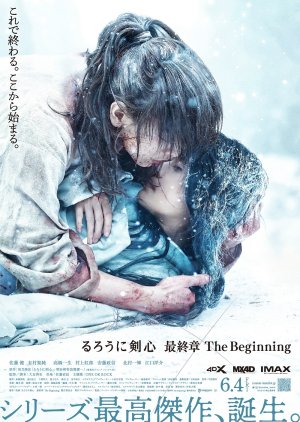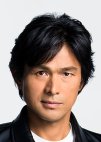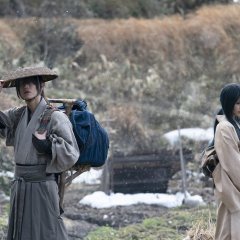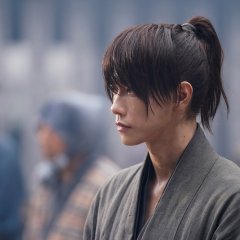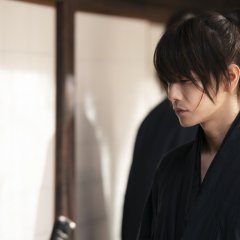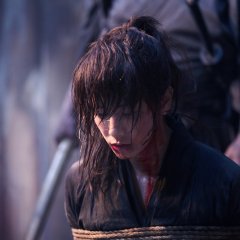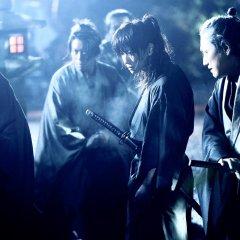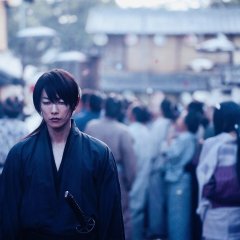 WCCS: Japanese movies from the 1940's and 1950's
WCCS: Japanese movies from the 1940's and 1950's - Português (Portugal)
- 日本語
- Arabic
- Русский
- Título original: るろうに剣心 最終章 The Beginning
- Também conhecido como: Rurouni Kenshin: Saishusho 2 , Rurouni Kenshin , Rurouni Kenshin 5 , Rurouni Kenshin: Final Chapter Part 2 , Rurouni Kenshin: Final Chapter , Rurouni Kenshin: Final Chapter 2 , Rurouni Kenshin: The Beginning , Samurai X , Samurai X Parte V: O Início , Samurai X: Capítulo F
- Roteirista e Diretor: Otomo Keishi
- Gêneros: Ação, Histórico, Drama, Artes Marciais
Onde assistir Samurai X: O Início
Subscription
Elenco e Créditos
- Satoh Takeru Papel Principal
- Arimura Kasumi Papel Principal
- Takahashi IsseiKatsura KogoroPapel Secundário
- Eguchi Yosuke Papel Secundário
- Murakami NijiroOkita SoujiPapel Secundário
- Kitamura KazukiTatsumiPapel Secundário
Resenhas

Esta resenha pode conter spoilers
Love and Redemption
Rurouni Kenshin: The Beginning is the fifth and final instalment of the live action adaptation of the Rurouni Kenshin manga series by Nobuhiro Watsuki. This film series finally ended after nearly a decade, having begun in 2012 when the first film was released.This finale features the origin story of Himura Kenshin aka Battosai set during the Bakumatsu - from just before the Hamaguri Gate Rebellion to the end of the Boshin War. Notwithstanding the rather spoilery film poster, fans of both the live action and manga series would have already been made aware of the momentous event that had taken place in Kenshin’s past which went on to shape his future, culminating in his present state as depicted in the preceding four films. However, the true account of what actually transpired has finally been chronicled and presented in this film.
At its very heart, this is a tale of love and redemption between the two main characters, Himura Kenshin and his first love, Yukishiro Tomoe. Personally, I do believe that one major benefit of knowing the outcome prior to watching the story unfold is that rather than anticipating the conclusion and/ or fearing the potential for an impending tragedy, viewers are able to focus on the subtleties of the storytelling while appreciating the development of the characters and nuances of the portrayals.
Among all the films in the series, this instalment is perhaps the most serious and compelling. It plays out more like an actual historical than a manga adaptation and explores much emotional depth and character evolution of its two leads. There is hardly any moment of levity and lightheartedness, in contrast to the earlier films. Even the action sequences for which the film series is famed, is very much subdued where significant portions of the swordplay is presented in the style of a vignette, complete with evocative instrumentals. Although there are two boss fights, they are not as thrilling as those in the other instalments.
Production wise, the quality levels remain consistent as one would expect of the same production team led by screenwriter-director Otomo Keishi. The cinematography is exquisite, showcasing the beauty of the seasons where autumn transitions to winter in the countryside, as well as the framing of poignant scenes shared between the leads in their humble abode. Camerawork and editing for the numerous sword fights and stunts remain exceptional, as has been the case throughout the series.
In terms of the acting, both Sato Takeru and Arimura Kasumi are perfect in their portrayals of Himura Kenshin and Yukishiro Tomoe. No one else can play Kenshin at this point and I can’t imagine someone else in the role of Tomoe. As much as I enjoy seeing Kenshin and Kamiya Kaoru (Takei Emi) together, the connection between Kenshin and Tomoe feels more absorbing. Theirs is a delicate love borne of turmoil and conflict that eventually nurtures and heals the soul. I was honestly blown away by their scenes together, especially towards the heartbreaking ending.
Rounding off the supporting cast, Eguchi Yosuke is back as Saito Hajime but with long flowing hair and without the cigarette dangling from his mouth (for the most part). Araki Towa has a bit part, playing the younger version of Yukishiro Enishi while Takahashi Issei provides an intriguing depiction of Katsura Kogoro.
I would rate this film as my second favourite of the series, with Rurouni Kenshin: The Legend Ends as my top favourite. It may not be as action packed, fun-filled or give off steampunk vibes as the others, but I’ve thoroughly enjoyed the character-driven emphasis and nuanced approach to the performances and storytelling, where viewers finally get to see how Battosai evolves from the killer to the pacifist. There is a tinge of melancholy now that the live-action series has come to an end, but what an eventful ride it has been.
Esta resenha foi útil para você?

A Dark Backstory Movie, With A Gruesome Duration Length…
Satou Takeru reprises his role once more as the redeemed former-warrior Himura Kenshin, only this time stepping back in time with the events of his past when he went under the alias Battousai. The storyline flitters between the " impending threat" ( though in typical Kenshin fashion, a villain who rarely escapes the realm of memorability after the movie) weapons dealer Yukishiro Enishi ( Araki Towa) as well as Kenshin’s relationship with Yukishiro Tomoe ( Arimura Kasumi).
The biggest thing to say about ‘ Rurouni Kenshin: The Beginning’ is that it is arguably more profound and violent than previous Kenshin movies. A particular gruesome scene appears on screen as a man writhes in agony with blood spurting out of his wounds and mouth, whilst the cinematography combines between moody and epic battle scenes, the vivid hues of festivals and the mundane and dull palettes of everyday life in Japan .This is no surprise considering the nature of the themes of assassins, fights and mercenaries found throughout the story but screenwriter Otomo Keishi purposely sets a vast shift and darker tone from previous movies throughout the storyline. Satou Takeru is brilliant as our main lead, adding a notable more stoic, hostile and mysterious ambience as the antihero of the movie rather than the beloved hero we have come to know in earlier ones. En par with Takeru was undeniably Arimura Kasumi as the suave and gradual love interest of Kenshin, Yukishiro Tomoe. The chemistry between the leads was evidently slow-burning and not your typical status quo romance( especially from what viewers can remember from the events of ‘ Rurouni Kenshin: The Final’ and the conclusion of the movie ) , but dynamic , heartbreaking and undeniably the intriguing highlight of the entire film.
On the other hand the storyline isn’t without its more sound flaws. Whilst Araki Towa is a brilliant actor, his onscreen persona as antagonistic weapons dealer Enishi is unimpressive and lacklustre to say the least. The plot threat of Einishi certainly keeps the plot moving, but his actual appearance and memorability do not quite reach their full potential. Adding on top of the trickier issues of the film production was the gruelling duration length of 2 hours 18 minutes which can slowly trial even the most patient viewers’ attention span.
On a more nuanced note it seemed an odd move by screenwriter Otomo Keishi to have released ‘ Rurouni Kenshin: The Final’ before the events of ‘ Rurouni Kenshin: The Beginning’. Whilst the movie does help to foreground a lot of the events from the previous storyline in more vivid detail (and understand more about Kenshin’s past), it would’ve seemed arguably a sounder move to have released this prequel movie first in order for viewers to grow sentimentality towards Kenshin and understand the greater impact of the events of the final movie. ( Therefore I’d recommend to newcomers or those still waiting to watch ‘ Rurouni Kenshin: The Final’ , to first complete ‘ Rurouni Kenshin: The Beginning ’ in order to understand the events of the former.) However, the finale of the film did deliver a beautiful shot of cinematography which stuns viewers with the shocking revelations and events to follow.
To conclude ‘ Rurouni Kenshin: The Beginning’ delved into the backstory of the beloved hero from the previous films with finesse and darker violence. The movie sometimes failed to reach its full potential or facilitate its antagonist towards being nothing more than a quick plot device and its tedious duration length , but the delivered performances by Takeru and Arimura, the stunningly filmed scenes and pretty much all of the performances by the main cast were well-deserved treats for viewers
Esta resenha foi útil para você?

